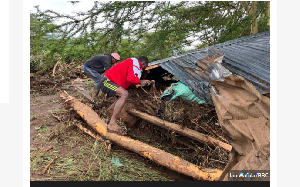- Home - News
- TWI News | TV
- Polls
- Year In Review
- News Archive
- Crime & Punishment
- Politics
- Regional
- Editorial
- Health
- Ghanaians Abroad
- Tabloid
- Africa
- Religion
- Election 2020
- Coronavirus
- News Videos | TV
- Photo Archives
- News Headlines
- Press Release
General News of Tuesday, 7 April 2009
Source: GNA
Government to expedite work on National Ambulance Bill
Accra, April 7, GNA - The Minister of Health, Dr George Sipa Yankey on Tuesday said government would expedite work on the passage of the National Ambulance Bill and transform the ambulance unit into a national ambulance service to make it more effective in providing pre-hospital services.
Government would also work hard to increase the fleet of ambulances, train more health personnel in emergency service delivery, procure air ambulances and construct heliports in selected health locations, he said. Speaking at this year's World Health Day on the theme: "Health facilities in Emergencies", he said 2009 World Health Day was a departure from its usual disease centred theme to one that was of great concern, adding that the state of preparedness of health facilities in the event of emergencies needed critical attention. He said the spate of road traffic accidents that had plagued the country recently exposed its unpreparedness to emergencies and noted that there was the need to step up strategies for accident prevention and develop a functional pre-hospital emergency system and prepare health facilities to handle emergencies.
Equally disturbing is the increasing proportion of diabetes and cardiovascular accidents, including stroke, which now contributed to the top five causes of mortality among reported deaths in the country, Dr Yankey said.
He was of the view that efficiency of the emergency departments in health facilities was a measure of how well the whole hospital or clinic functioned and that to some extent it was also a measure of efficiency of health services in general. The manner in which staff in these departments handled the most difficult of conditions gave one an insight into the level of quality care and professionalism with which patients were handled, he said.
Dr Yankey said, "We need to keep reminding ourselves of the need to focus our attention on emergencies. At the individual level we must start adopting healthier lifestyles that would reduce the need for emergency services. At the community level we must ensure that we keep the environment clean and safe and adopt safe workplace practices and be more responsible for life and safety of others.
"We cannot continue to explain away the loss of precious lives like that. It is for this reason that I have identified emergency services as one of the prime areas for investment by government," he said. Dr Yankey added that the country needed to start planning for strategic location of facilities in a way that would reduce the loss of life and the limb in cases of accidents. This, he said, called for all stakeholders including National Disaster Management Organisation (NADMO), Ghana Private Road Transport Union (GPRTU) and Ministry of Roads and Highways because handling emergencies was not limited to the Ministry of Health.
World Health Organization (WHO) country Representative, Dr. Daniel Kertesz, said emergencies exerted a greater toll on human suffering and noted that road accidents killed 3,200 people around the world every day - at least 90 per cent of these deaths occurred in low and middle income countries. In the past 12 years, two-thirds of major humanitarian crises worldwide occurred in African countries and that in 2008 alone, more than 90 per cent of African countries were affected by emergencies such as flood, droughts, disease outbreaks and varying degrees of conflicts.
Dr Kertesz said WHO was therefore advocating a series of best practices that can be implemented, in any resource setting, to make hospitals safe during emergencies adding that apart from safe location and resilient construction, good planning and carrying out of emergency exercises in advance could help maintain critical functions.
He said proven measures ranged from early warning system to simple hospital safety assessment, from protecting equipment and supplies to preparing staff to manage mass casualties and infection control measures adding that it was smart to think and plan ahead. Prof. Nii Otu Nartey, Chief Executive of Korle Bu Teaching Hospital, said the preparedness of health facilities to handle emergencies can no longer be taken for granted or assumed to be remit of few hospital.
He said disaster can occur anywhere and so was the need to deal with its associated emergencies although in reality few hospitals could be designated centre of excellence, adding that, every health facility in Ghana should have at least a basic emergency preparedness, response arrangement and support structures. He recommended, among others that, policy makers should take emergency preparedness and response seriously and develop policies that built capacity of health facilities gradually over time. 7 April 09










